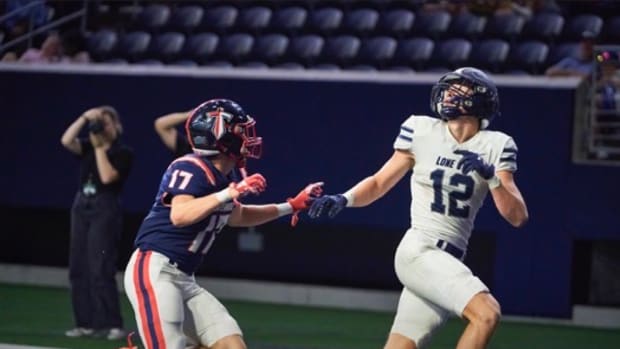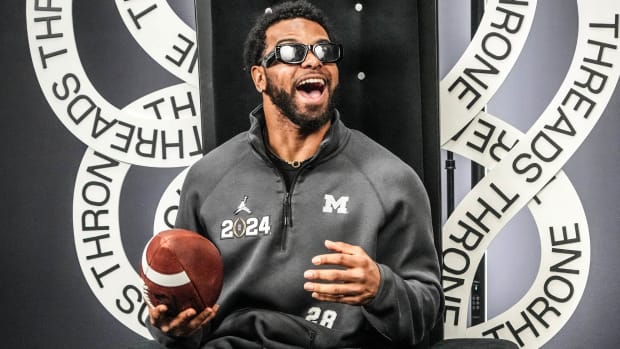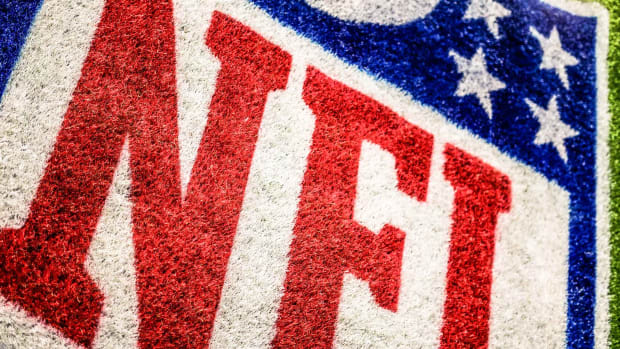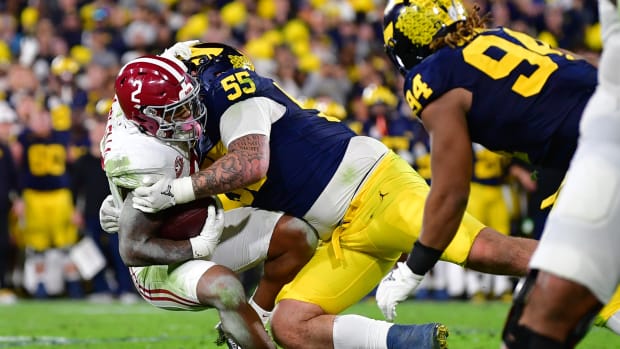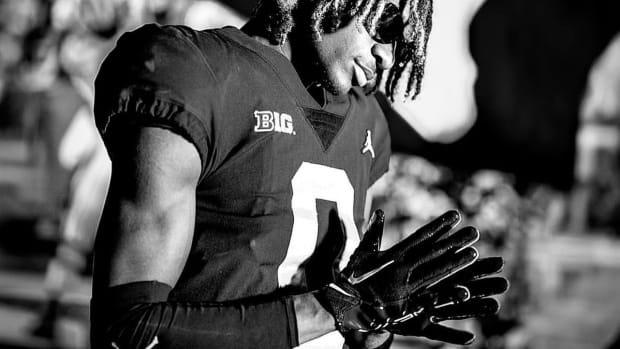Questions We're Asking: Is A Close Bowl Loss Good Enough For Michigan?
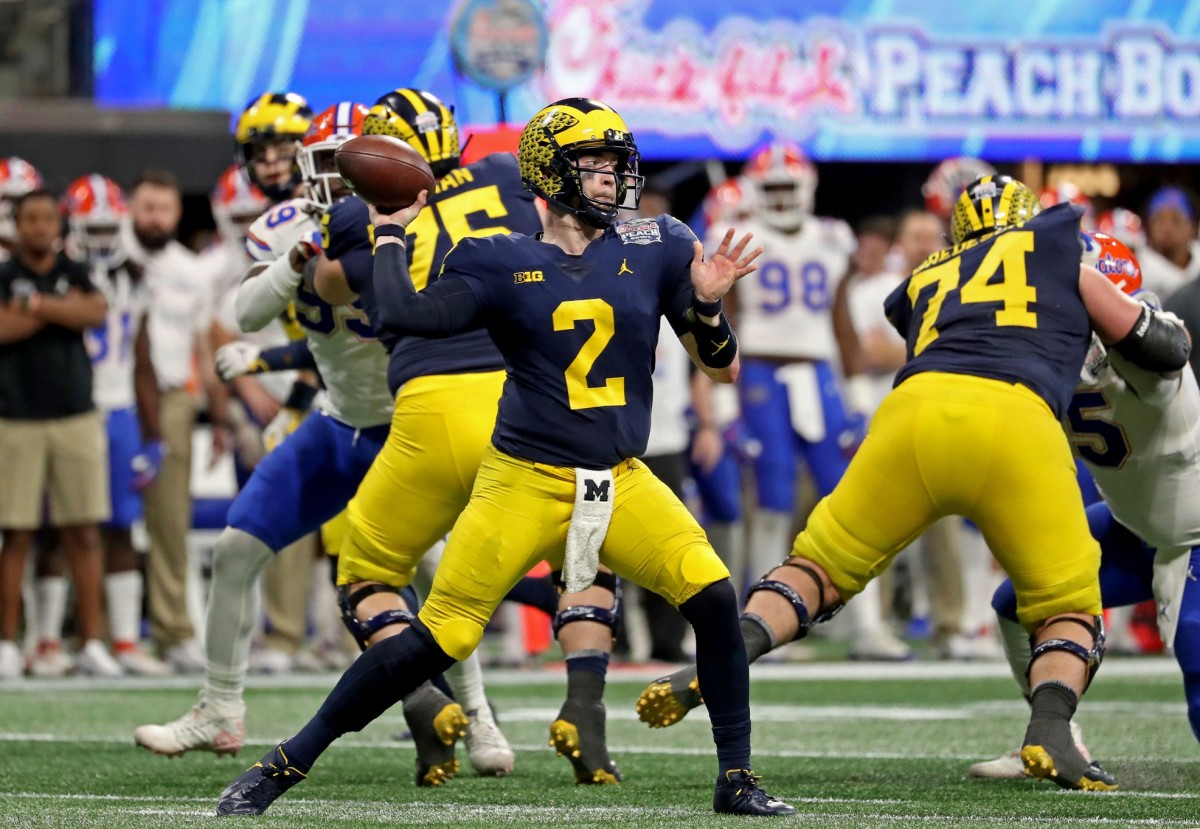
Would a close loss to Alabama qualify as a step forward heading into the offseason?
"We don’t have to win this game to come out with something positive. We have to be competitive." - current U-M radio analyst Dan Dierdorf.
Let me start by saying I'm a huge fan of Dierdorf. I've known him for about 15 years going back to the days I was a young cub at The Wolverine and covered his daughter, Katie, on the Michigan basketball team.
He is one of the preeminent Michigan Men of all time, one of the toughest, fiercest, most dominant offensive linemen in the history of football (he is in both the NFL and college football Hall of Fame). He is the model for which all of "Bo's Boys" gets measured against. He loves his alma mater, represents the ideal that "Those Who Stay Will Be Champions" and is extremely competitive.
So when he uttered those two sentences during an interview we did Dec. 20 for our weekly #GameOfMyLife, I was shocked. Is this what Michigan football has been reduced to? Moral victories?
I, for one, am not expecting the Wolverines to beat Alabama in Wednesday's Citrus Bowl. The Crimson Tide remain a 7-point favorite even with a few of their best players absent -- rush end Terrell Lewis and cornerback Trevon Diggs voluntarily sitting out to protect their NFL Draft stock - but to concede that a close loss is good enough, especially coming from someone that was a foundational player of the Schembechler era ... makes you wonder if this is how far Michigan has fallen.
Forget the college football playoffs. Forget beating Ohio State and winning Big Ten championships, just don't get embarrassed against the best teams on your schedule and all is copacetic? Not only that, it's a positive going into the offseason?
No, no, no. Not if the goal of the program remains all those things I just mentioned. A victory over Alabama gives Michigan a true launching pad and perhaps signals that this program has a recipe for overcoming the talent gap that still exists between U-M and the nation's best teams - Bama and OSU are Nos. 1 and 2, respectively, in 247Sports.com's composite team talent rankings for 2019 while the Maize and Blue are 11th - largely an offensive onslaught and some timely defensive stops.
To accept a close loss as good enough essentially says "9-3 at Michigan is good enough" as U-M only needs to be competitive against the three or four best teams it plays each season.
For what it's worth, I don't blame Dierdorf for falling into this mental place. I admittedly went there after the OSU game too (and as a fan am still struggling to shake off that malaise).
How many times can the Wolverines lose to Ohio State in embarrassing fashion or lose another game to a Top 10 team (Michigan is 0-5 and 2-11, respectively, in the Jim Harbaugh era) before one loses hope and begins looking for something, anything, to be inspired by?
Still, at some point U-M has to win these kind of games or it will be stuck perpetually in the same cycle over and over again where winning 10 games is the ceiling and losing to Ohio State and its bowl game is not only the norm (it is now) but is also an acceptable outcome and the future measure of success for the program.
Now, accountability talk really has no bearing on Michigan's future prospects, unless of course that chatter among fans and prominent alums rises to such a din that leads to a coaching change at the top. Still, Dierdorf's comments are dangerous if they, at any way, reflect an attitude within the program. (I was recently told by an impeccable source close to Jackie Harbaugh - Jim's mom - she didn't want to make the bowl trip for fear of seeing her son "take another beating.")
Five years into the Harbaugh tenure, Michigan finds itself stuck. It has certainly rebuilt the program from the Rich Rodriguez/Brady Hoke days, but it can't get over the hump and it can no longer sell hope to recruits. Five years in, a program has to sell results and the results are underwhelming. Harbaugh's job on the recruiting trail gets incredibly harder with each season that passes without a championship and with each mounting loss to a Top 10 team.
Losing to Alabama only furthers the narrative that U-M is a great landing spot for second-tier prospects (still Top 250 players, just not the Top 50-100 that are necessary to compete at the highest level) while a win provides Harbaugh, arguably, the most impressive victory of his career in Ann Arbor and could signal to recruits that Michigan is on the verge of the proverbial "turning the corner."
Being competitive accomplishes nothing but more of the same, and another long offseason in which the national (and local) media has an ammo dump full of criticism for Harbaugh and Michigan (and they wouldn't be wrong). U-M has to have a victory Wednesday to enjoy a positive bump and an offseason of possibilities.
What do you make of Don Brown's Sunday comments that Michigan "has moved on from [its loss to Ohio State]"?
Brown spoke to the media this morning ahead of Wednesday's Citrus Bowl game against Alabama and said the only thing he could about the Ohio State game - that U-M has moved on from it and won't allow it to linger and impact the next game.
Brown was in a lose-lose situation today addressing the media for the first time since the 56-27 loss to Ohio State. There was literally nothing he could say that would placate fans. Frankly, Brown has been down this road before and has largely failed the press conference, his claims after lopsided defeats to Penn State and Ohio State that he would learn from them and never let them happen again have looked more and more hollow with each bad loss in which the defense cratered.
After the OSU game last year he appeared to abdicate responsibility, blaming the 62 points U-M allowed not on schematics but on not having good enough athletes to match up with the Buckeyes' elite talent. He did resort to a Brown trope again today when he brought up something good Michigan had done this year, as almost "it wasn't all bad," when he noted: "we went eight weeks in a row with giving up about 11 points in a game. We’ve got to get back to that style of play."
Brown likes to do that. When he's asked questions from the media about struggles, he has a stat that emphasizes a strength of the U-M defense. He doesn't want an entire season diminished by one or two games, but it's also tone deaf because it ignores the fact that in marquee matchups against great offenses the Michigan defense has a tendency to go MIA and those games are the difference between playing for the Big Ten title or not.
But I won't kill Brown for his press-conference comments because frankly nothing he can say matters. The results speak louder than words, and it's clear in allowing 118 points the past two games to Ohio State that Brown actually has no answers.
The only truth is that Brown's unit has to play second-fiddle now in THE Game. As college football demonstrates over and over again (and did again in Saturday's playoffs), offense rules and defenses have just two goals - get stingy in the red zone and force turnovers.
They can't be expected to slow down these Goliath offenses, but just get a few important stops - in yesterday's 29-23 win over Ohio State, Clemson's nationally-ranked No. 3 defense allowed 516 yards but forced three field goals in the red zone and had two interceptions during the game.
In the last two matchups against the Buckeyes, Michigan has forced just two turnovers and has allowed touchdowns on 8 of 11 OSU trips to the red zone (and scores on 10 of 11 total trips).
U-M needs more playmakers, more ball-hawking defensive backs, needs to be more effective at getting to the quarterback, needs to call a better game plan in the red zone, and needs a few breaks too. It doesn't need to hold Ohio State to 24-28 points. Frankly, 35-38 should be the new expectation.
Brown, who is expected back despite rising discontent among the fans, needs to adjust to a new reality and focus less on the "eight games in a row giving up 11 points" and more on playing complementary football to a burgeoning offense that actually represents the best hope for the future.
Who is the key to Michigan basketball's chances at Michigan State next Sunday?
Zavier Simpson's play will be critical to any chance the Wolverines have in East Lansing. Especially playing shorthanded without junior wing Isaiah Livers (there is a chance he returns after sitting out today's game against UMass-Lowell and resting for more than a week after suffering a groin injury Dec. 21), but regardless of Livers' status, Simpson has to play his best game of the year to spring the upset.
Simpson has been an enigmatic player this season. He remains Michigan's best ball distributor with 8.9 assists per game and is averaging a career-high 11.2 points per game but he's also committing turnovers at an alarming rate - with four turnovers Sunday he has turned the ball over four or more times in three straight games for the first time in his two-plus seasons as U-M's starting point guard.
Defensively, he has been exposed by elite point guards this season, but remains ferocious on the defensive end, and continues to set the tone for the Wolverines on both ends of the floor.
Two years ago, as U-M went 2-0 against Michigan State, Simpson was considered a "Cassius [Winston] killer," limiting the Spartans' best player to 11.0 points per game, 35.3% on field goals, including 16.7% on threes, while forcing five Winston turnovers.
A year ago, though, Winston got the better of Simpson; in three MSU wins, Winston averaged 21.3 points per game, shot 44.2% overall (though just 15.4% from threes) and had 26 assists compared to only 11 turnovers.
Expecting Simpson to silence Winston like he did in 2018 is unfair. Winston remains one of college basketball's best players, but if he dominates the matchup like he did in 2019, Michigan doesn't have a chance. Simpson needs to eliminate the unforced errors and shoot better from deep - last year against MSU he was 2 of 13 from behind the arc. The good news: he's shooting a career-best .400 from three this year.
Wit Tom Izzo almost certainly going back to the well defensively, clogging penetration lanes and forcing Simpson to shoot the three, Michigan's senior has to be effective and fill in some of the scoring gap if Livers is out. At the same time, he can't play the hero ball he did in a Top 10 loss to Oregon two weeks ago. Simpson is at his best when he takes timely open shots, distributes, making the players around him better, makes smart decisions with the ball and stays in front of his opponent.
If THAT Simpson shows next weekend, Michigan can win. If the careless-with-the-ball, tries-to-take-over Simpson emerges, U-M could lose by double digits.

